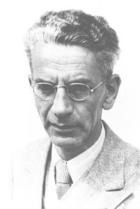
Karl Löwith Munich, Germany, 1897 - Heidelberg, Germany, 1973
Alumnus Edmund Husserl and Martin Heidegger, Löwith left Germany in 1936 because of his Jewish origin. He lived for some years in Japan, where he was fascinated by the relationship of Zen philosophy with anything not originating in nihilism. In 1941 he moved to the United States, and then returned to Germany, where he taught at the University of Heidelberg. Löwith considers the development of European thought as a process of secularization of the theological-biblical view of history, characterized in turn by the hope of an "eschatological future." To distance themselves from the violence of the Western logos, Löwith oriented to nature not considered history, destiny and creation, and in which death is a component to which the subject does not find its authenticity.




